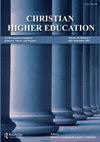Sharing the Wonder: Service-Learning as an Avenue for Faith Integration in Mathematics
IF 0.4
Q4 EDUCATION & EDUCATIONAL RESEARCH
引用次数: 0
Abstract
Abstract The study described in this article was designed to assess students’ faith integration (FI) learning in a mathematics writing course and its impact on service-learning (SL) as well as to understand how SL can be used to help students think in new ways about the integration of mathematics and faith. A Scholarship of Teaching and Learning methodology (SoTL) was employed, with the intention of using the results to improve course design. The study was conducted in a mathematics writing course for undergraduate math majors. Both qualitative and quantitative data were collected and analyzed in a mixed-methods study design. Findings indicated that, following the SL experience, all of the students articulated FI perceptions related to mathematics, and a majority of the new faith-related understanding emerged from their SL experience. However, when prompted, fewer than half of the students expressed a purpose for engaging in service that connected their Christian faith and communicating about math; instead, most students indicated that their faith inspired them to demonstrate good behavior or be a “role model.” Post-SL visit survey results corroborated these findings: Although 80% of the students indicated agreement that the SL experience allowed them to live out Christian values, less than 60% identified themselves as being able to understand the connection between the SL experience and their personal faith. In response to the findings, potential modifications that could be introduced in this mathematics writing course, as well as other similar courses, are presented and discussed.分享奇迹:服务学习作为数学信仰整合的途径
摘要本研究旨在评估学生在数学写作课程中的信仰整合(FI)学习及其对服务学习(SL)的影响,并了解如何利用服务学习来帮助学生以新的方式思考数学与信仰的整合。采用了教学与学习方法论(SoTL),目的是利用研究结果来改进课程设计。本研究是在数学专业本科学生的数学写作课程中进行的。在混合方法研究设计中收集和分析定性和定量数据。研究结果表明,在SL体验之后,所有学生都清晰地表达了与数学相关的FI感知,并且大多数与信仰相关的新理解都来自他们的SL体验。然而,当受到提示时,只有不到一半的学生表达了参与服务的目的,将他们的基督教信仰与数学交流联系起来;相反,大多数学生表示,他们的信仰激励他们表现出良好的行为或成为“榜样”。SL访问后的调查结果证实了这些发现:尽管80%的学生表示SL体验让他们活出基督教价值观,但只有不到60%的学生认为自己能够理解SL体验与个人信仰之间的联系。针对这些发现,本文提出并讨论了在这门数学写作课程以及其他类似课程中可能引入的修改。
本文章由计算机程序翻译,如有差异,请以英文原文为准。
求助全文
约1分钟内获得全文
求助全文

 求助内容:
求助内容: 应助结果提醒方式:
应助结果提醒方式:


